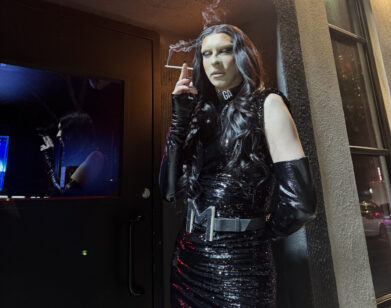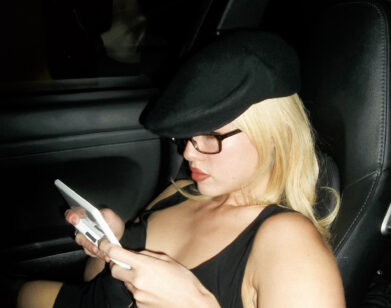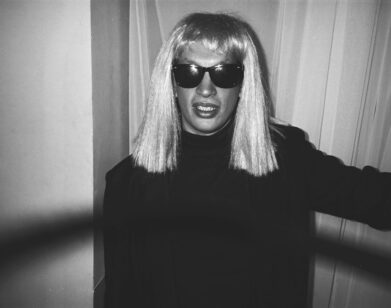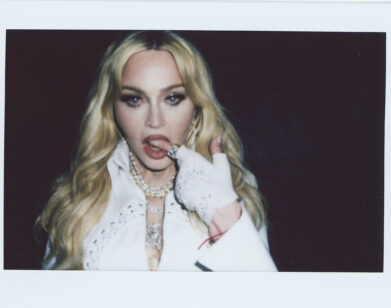Fletcher On Writing Her Own Story, And Not Writing Drunk Texts

Fletcher, born Cari Elise Fletcher, knew from a young age that she didn’t fit the “cookie cutter” pop star mold. As a result. she set out to write, and sing, her own narrative—one that is inclusive, relatable, and non-conformist. “Growing up, the antiquated pop star stereotype was all that I had as female representation, and I didn’t ever really see myself in that,” she says. “From a really young age, I set out to make it my mission to be the artist that I really needed when I was a little girl.”
Fletcher moved to New York City to attend The Clive Davis Institute of Recorded Music at NYU, where she wrote her breakout song “War Paint,” which went viral on Spotify and eventually led to a deal with Capitol records. Besides earning a degree, Fletcher, unknowingly, found the inspiration for her upcoming LP, you ruined new york city for me. “When I moved [to NYC] I fell in love for the first time and I had my heart completely broken into a bazillion pieces, and it was kind of like a toxic situation,” she says.
Although Fletcher’s latest music details the aches and pains of a broken heart over synths and pop beats, her message goes beyond the constraints of love and the pain it brings. “My music really focuses on the female perspective and the human perspective,” Fletcher told me, when I met her in Nashville. “I never really want anyone to be taken out of the story because they don’t identify with who or what I’m talking about.”
Ahead of her performance at Jack White’s Third Man Records, as part of Audi’s launch event for the Audi Q3, Fletcher held nothing back and caught up with Interview about the importance of using her “digestible and palatable” privilege to tell underrepresented queer stories, why Joan Jett and Lady Gaga have been her saving grace, and the best alternatives to sending that 5 a.m. drunk-text.
———
ERNEST MACIAS: You don’t use pronouns in your music. We live in a time where people really don’t want to be subject to those constructs. Why is that important for you and your music?
FLETCHER: I think I create best from a place of sadness and being heartbroken. Nobody wants to hear you write a song about being happy and financially stable or emotionally supported. Because that’s just not relatable. Life’s tough, and love’s tough. Often times, music allows you to express things that you maybe wouldn’t be able to actually vocalize, especially in terms of songwriting. It’s important to me because I never want anyone to be taken out of a song or not relate to what I’m saying. I want to be able to make music just based off of the human experience and also, it doesn’t matter who broke your heart—if it was a man, woman, trans man, trans woman, or non-binary person. It’s still the shittiest feeling in the entire world, having your heart broken. The heart doesn’t have a gender.
MACIAS: I remember when you first released “War Paint,” there was a whole conversation surrounding your sexuality. How did you react to people focusing on that?
FLETCHER: I was a theater, nerdy, music, queer kid that was not cool. I think because of where I came from, I was really scared about depicting sexuality and being anything other than what people expected me to be. So yeah, it’s a scary thing because it’s really vulnerable. But at the same time if I’m not living my truth and using my platform to have these conversations and help push the world in a more progressive and inclusive place, then what the fuck’s the point of ever even having a platform? Representing queer stories is not my headline. My queerness is not the headline of the story by any means, it’s just part of my story. But at the same time it is really important, and I’m fortunate that I even get to speak about it as freely as I do because it’s not like that all over the world and even within our own community. Trans women of color are the most marginalized, underrepresented, abused, and assaulted within our own community. The fact that I am digestible and palatable for the white cisgender masses of America—I have to use that privilege to be able to say things and have conversations like this.
MACIAS: You say you didn’t see yourself represented growing up, when you were trying to make music. Who were some people that you really felt like they were doing it for you?
FLETCHER: I look to people like David Bowie and Joan Jett and Patti Smith—people that were kind of gave the middle finger to the system and pushed themselves outside of boxes, and didn’t adhere to social constructs and stereotypes. I always felt such a sense of peace in seeing that. I think Madonna‘s done that. I think Lady Gaga has done that. Those people have really been huge inspirations and my saving grace. Even now, there’s so many artists who are out there living their truth and speaking it boldly and unapologetically.
MACIAS: Listening to the three songs that you’ve released in 2019, you’re talking about heartbreak, obviously, and in “Undrunk,” you sing about it being five in the morning and how you don’t want to text a certain person. What are some alternatives to sending a risky, late night text like that?
FLETCHER: [Laughs] Give your phone to your best friend and be like, “Don’t let me hit this person up.” Take another shot of tequila—or maybe don’t, that may lead to an even sloppier text. You just have to surround yourself with people that make you feel like the best version of yourself, distract you, and take your mind off that person. Get out of your head, and get out of the house.






